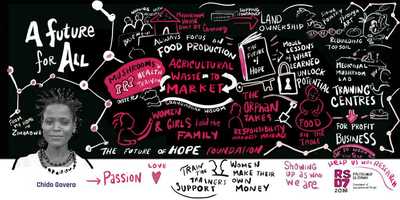The Future of Hope: Social care for sustainable living
Govera, Chido (2018) The Future of Hope: Social care for sustainable living. In: Proceedings of RSD7, Relating Systems Thinking and Design 7, 23-26 Oct 2018, Turin, Italy.
![Govera_Hope_2018.jpg [thumbnail of Govera_Hope_2018.jpg]](https://openresearch.ocadu.ca/2671/1.hassmallThumbnailVersion/Govera_Hope_2018.jpg)  Preview |
Image
Govera_Hope_2018.jpg Download (83kB) | Preview |
Abstract
The presentation explores approaches and interventions implemented by The Future of Hope Foundation (TFoHF) to engage marginalized members of society, specifically women and girls in Zimbabwe. With limited resources and many heavy responsibilities as well as lack of exposure to innovative initiatives, vulnerable women, girls and orphans in communities are unable to engage in socio-economic development and to reach their full potential. They are in a continuous struggle just to survive. In a country where almost 10% of the population is orphans, 70% of the population lives in extreme poverty and political and economic turmoil are on the rise there is need for innovative interventions to enable these vulnerable groups to sufficiently provide for their primary needs and concerns as this is the foundation to achieve sustainable living.
TFoHF leverages agro-biomass, the most abundant resource in most poor communities, to secure sustainable livelihoods and incomes through their Mushroom based Integrated Food Production System (Mushroom based IFPS). The Mushroom based IFPS addresses many challenges facing vulnerable women and girls. Of special note are issues relating to land ownership, control of own food and income source as well as access to market. By harnessing the power of collaboration, TFoHF is able to mobilize community women as mentors for young girls orphans and community leaders to support community Mushroom based initiatives from initiation stage to market linkages. These collaborations provide the base for building healthy Communities where children, women and all of life, can thrive in peace, freedom and happiness – healthy Communities that nurture and promote good ethics, good education, good health and care for the natural ecosystems. Responsible engagement, accountability and proactivity are modeled and prioritized over self-pity and victimhood.
To date, TFoHF has reached over 2000 people in Zimbabwe and built a model that can be easily replicable across the African continent and beyond. The work carried out over the years does not only serve to mark an end to victimhood through responsibly engaging orphans and vulnerable groups to become change agents and leaders but, it provides basis for research and further improvements of this initiative that has such great potential.
| Item Type: | Conference/Workshop Item (Keynote) |
|---|---|
| Date Deposited: | 19 Jun 2019 14:30 |
| Last Modified: | 02 Aug 2021 08:46 |
| URI: | https://openresearch.ocadu.ca/id/eprint/2671 |
Actions (login required)
 |
Edit View |

 Tools
Tools Tools
Tools